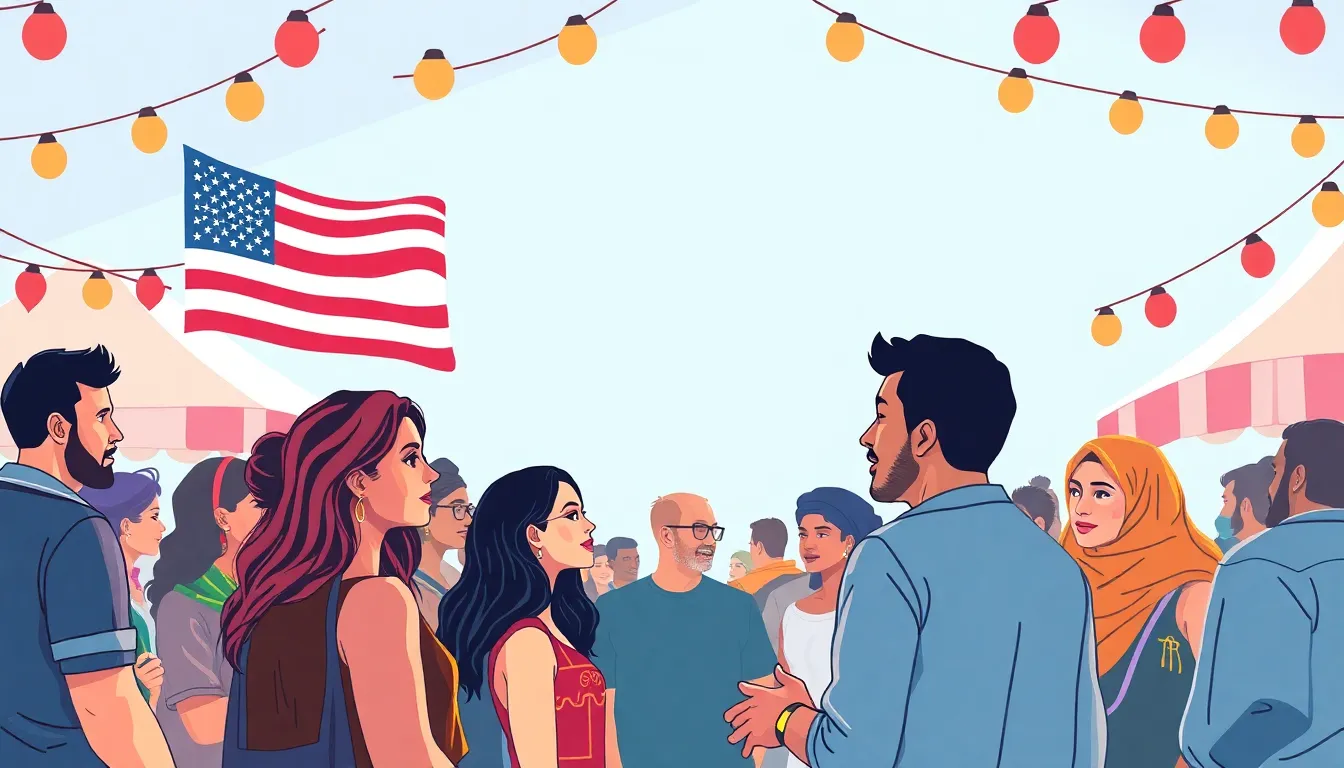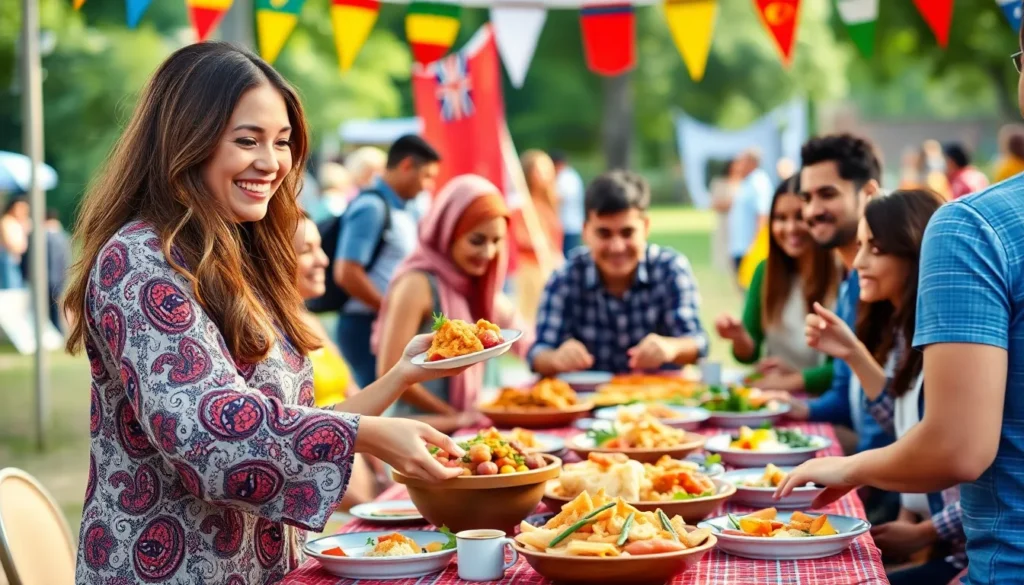Table of Contents
ToggleCultural exchange is like a global potluck where everyone brings their favorite dish, and no one leaves hungry for knowledge. It’s the delightful dance of ideas, traditions, and customs that transcends borders, making the world a smaller, more vibrant place. Imagine swapping stories over tea with someone from halfway around the globe or learning to cook a dish that’s been passed down through generations.
Cultural Exchange Definition
Cultural exchange refers to the reciprocal sharing of ideas, traditions, and customs between different societies. Engaging in cultural exchange fosters understanding and appreciation among diverse groups. This process occurs through various means, including international travel, educational programs, and art exhibitions.
Numerous activities facilitate cultural exchange. Language immersion programs allow individuals to learn new languages while experiencing local traditions. Cooking classes offer opportunities to explore national dishes, combining flavors and techniques from different cultures. Festivals often showcase traditional music, dance, and art, bringing communities together in celebration.
Statistics reveal the impact of cultural exchange. According to UNESCO, cultural exchange can enhance peacebuilding and mutual respect among nations. In a study done in 2022, 78% of participants reported increased cultural awareness following exchange programs. Additionally, organizations like the Peace Corps promote cultural exchange as a vital component of international service.
The importance of cultural exchange extends beyond personal growth. It strengthens diplomatic relationships and encourages global collaboration. By embracing cultural diversity, individuals contribute to a richer global society, fostering connections that transcend geographical boundaries. Such connections create networks of support, enabling shared solutions to common challenges.
Importance of Cultural Exchange

Cultural exchange plays a crucial role in fostering global understanding and appreciation. Engaging with diverse cultures enriches communities and strengthens interpersonal relationships.
Benefits of Cultural Exchange
Cultural exchange enhances knowledge and promotes tolerance among individuals. Language skills improve significantly through immersion experiences. Social connections develop as participants build friendships with people from various backgrounds. Economic benefits arise from tourism linked to cultural exchanges, promoting local economies. Education systems also benefit; students exposed to different cultures gain critical thinking and adaptability skills. A 2022 study revealed that 78% of participants in exchange programs reported heightened cultural awareness.
Challenges of Cultural Exchange
Cultural exchange faces several challenges that can undermine its effectiveness. Misunderstandings often arise due to cultural differences, resulting in unintentional offense. Logistical issues, such as travel restrictions, can hinder participation in exchange programs. Additionally, financial barriers may limit access for some individuals. Emotional adjustment poses another challenge; individuals may experience culture shock when exposed to new environments. Organizations must continuously address these challenges to facilitate effective cultural exchange initiatives.
Types of Cultural Exchange
Cultural exchange occurs in various forms, each contributing to a deeper understanding of diverse traditions and customs.
Formal Cultural Exchange Programs
Formal cultural exchange programs involve structured initiatives designed to promote cultural understanding. Educational institutions often sponsor these programs. For instance, universities may offer exchange semesters that allow students to immerse themselves in a different culture. Participants in these programs benefit from organized activities, such as workshops and seminars. According to the Institute of International Education, over 300,000 students in the United States participated in formal exchange programs in 2021. Government-sponsored initiatives like the Fulbright Program also play a significant role in fostering international collaboration through cultural exchange.
Informal Cultural Exchange
Informal cultural exchange happens organically through everyday interactions. Individuals can experience informal exchanges by engaging in cultural festivals, local cooking classes, or community events. Social media platforms enable people to share their traditions and customs with a global audience, facilitating immediate connections. Travel also promotes informal exchange, as tourists often learn about local practices from residents. In fact, a 2020 survey revealed that 65% of travelers reported learning something new about another culture during their trips. Such exchanges not only enhance personal growth but also foster friendships across cultural boundaries.
Impact of Cultural Exchange on Society
Cultural exchange significantly influences society by fostering understanding and appreciation among diverse groups. Enhanced knowledge emerges as individuals learn about different traditions and customs, leading to greater cultural awareness. A 2022 study revealed that 78% of participants in exchange programs reported increased awareness, underlining this impact.
Strengthened diplomatic relationships result from meaningful cultural interactions. Countries engaged in exchanges often experience improved collaboration on global issues. Organizations like the Peace Corps highlight the importance of cultural exchange in international service, creating networks of support for common challenges.
Economic benefits also play a crucial role. Tourism flourishes in areas that embrace cultural exchange, providing locals with opportunities to share their heritage. Students gain educational advantages through exposure to diverse cultures, enriching their learning experiences.
Social connections form as friendships develop between individuals from different backgrounds. Improved language skills often accompany these interactions, enhancing communication and fostering deeper relationships. Informal cultural exchanges, such as local cooking classes or cultural festivals, contribute to this social fabric.
Challenges may arise, including misunderstandings and logistical issues. Organizations addressing these barriers can facilitate smoother exchanges. Financial obstacles and emotional adjustments, such as culture shock, require careful consideration to ensure effective participation.
Formal cultural exchange programs maintain structure, often sponsored by educational institutions. Initiatives like the Fulbright Program, with over 300,000 U.S. students participating in 2021, exemplify successful formal exchanges. Informal exchanges occur naturally, with social media playing a vital role in sharing traditions globally. A 2020 survey indicated that 65% of travelers learned something new about another culture during their trips, illustrating the personal growth fostered through these interactions.
Cultural exchange plays a vital role in shaping a more interconnected world. By sharing ideas and traditions, individuals gain a deeper understanding of diverse cultures. This exchange not only enriches personal experiences but also fosters global collaboration and strengthens diplomatic ties.
While challenges exist, the benefits of cultural exchange far outweigh the obstacles. Through both formal programs and informal interactions, communities can cultivate appreciation and respect for one another. Ultimately, embracing cultural exchange can lead to a more harmonious and vibrant society, where everyone has the opportunity to learn and grow together.







